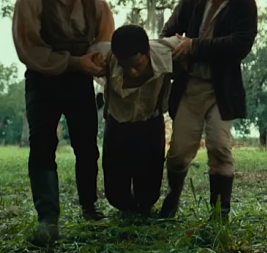 Michael Cusumano here. Oscar balloting closed 24 hours ago and this final crunch before Oscar night has me pondering the gap between pre-Fall buzz and the reality heading into the big ceremony.
Michael Cusumano here. Oscar balloting closed 24 hours ago and this final crunch before Oscar night has me pondering the gap between pre-Fall buzz and the reality heading into the big ceremony.
If the breathless predictions about 12 Years a Slave that sounded out of Toronto last September were to be believed there should have been zero suspense left in the Best Picture race long ago. Like The King’s Speech before it, McQueen’s film appeared to be such a direct hit to the Academy’s sweet spot that many called the race then and there. So what happened? 12 Years may still emerge victorious but why isn’t it rolling over the competition like a Sherman Tank?
The popular theory is that 12 Years is turning off the more squeamish voters with its unsparing physical and emotional violence. These voters are supposedly fleeing to the comforts of Gravity, which is nerve-shredding but in the unthreatening context of an action-thriller. This seems logical enough but I wonder if it's too easy an answer.
Is 12 Years a Slave really too rough for awards voters? Or is something larger at play?
I would argue the real thing holding back McQueen’s film isn’t its brutality but its lack of catharsis. The unspoken agreement with the audience is that a film like Slave might push the limits of your endurance but that will make it all the more sweet when the hero is triumphant at the end. To put it bluntly, Steve McQueen's film doesn't deliver the happy ending goods. A film can get away with depicting the most appalling of horrors if it wraps things up on a note of uplift. Conversely, if a film doesn’t make audiences leave the theater feeling terrific, it’s going to be a tough sell no matter how noble its message.
Just look at Schindler’s List. One could argue its catalogue of cruelties surpasses that of 12 Years a Slave, yet rarely has history seen a bigger Oscar lock. That the film wasn’t held back by its violence can be attributed to a variety of reasons (Spielberg’s clout, media attention, strong box office) but a big factor was surely that even amid the film’s atrocities its ultimate emphasis was on Schindler’s success. Schindler couldn’t do everything, but he did what he could, and to paraphrase Ben Kingsley’s character “there will be generations” as a result.
Solomon Northup also uses everything in his power to fight back, but unlike the hero of Spielberg’s film, most of his efforts amount to nothing. His attempts to contact the outside world are betrayed, the sympathetic plantation owner turns a deaf ear to his pleading, and his escape on foot is stopped cold at a lynching before it has barely begun. The film is clear: Solomon’s courage and cleverness will not save him. Yes Solomon is ultimately set free thanks to a combination of luck and the kindness of strangers but by that point he has all but given up. His belated freedom does little to erase the despair of Solomon joining the other slaves in singing “Roll Jordan Roll” essentially resigning himself to his fate.
I have little doubt 12 Years a Slave would be cruising to a double-digit Oscar tally if McQueen found an ending like the final moments of Schindler’s List where the surviving Schindler Jews are revealed, living proof of Oskar Schindler’s accomplishment. Any joy the viewer might take at Solomon Northup’s liberation is tempered by the devastating final scene where Solomon finds time has made strangers of his family. Likewise, Schindler’s List ends with Ralph Fiennes monstrous Amon Geoth hanged and the Nazis destroyed. In Slave, Fassbender’s plantation owner not only escapes unscathed, but Lupita Nyong’o’s Patsy is left behind in his clutches, to suffer for the rest of her days, one assumes.

If Gravity is victorious on March 2nd some will express surprise that an action movie trumped a film that superficially appears to be far more Oscar-friendly. But a look beyond the surface should make it clear that Gravity’s inspiring theme of rebirth and release from the past places it closer to the Academy comfort zone than the grim, uncompromising realities of 12 Years a Slave. The film’s pivotal image may be Solomon marching to freedom with Michael Fassbender’s Edwin Epps spitting venom at him every step of the way. One man escapes but society is unchanged. The poison stays in the bloodstream. The unsettling implication being that it remains there to this day.

Previous Burning Questions. Follow Michael C. on Twitter at @SeriousFilm or visit his personal blog Serious Film
